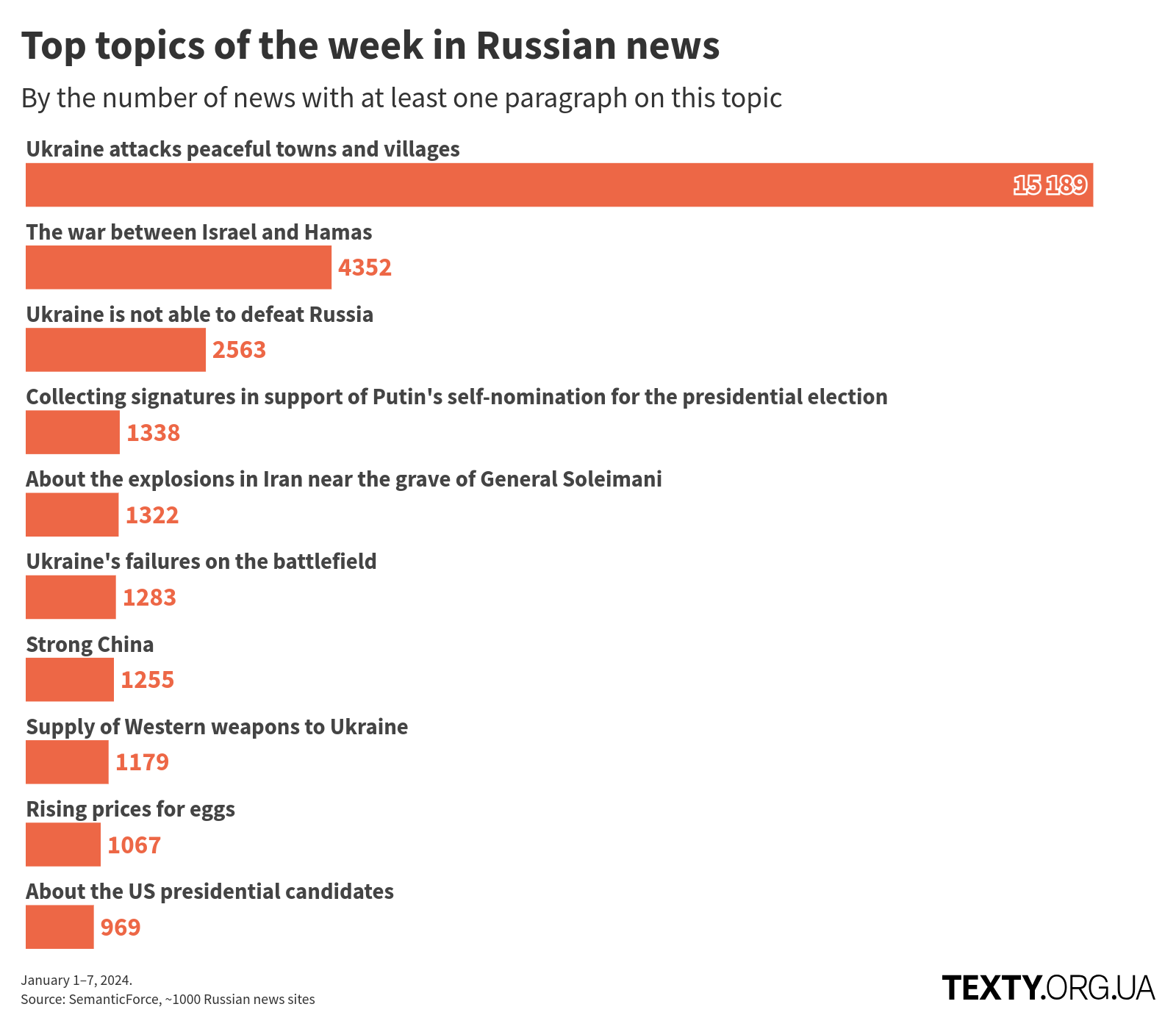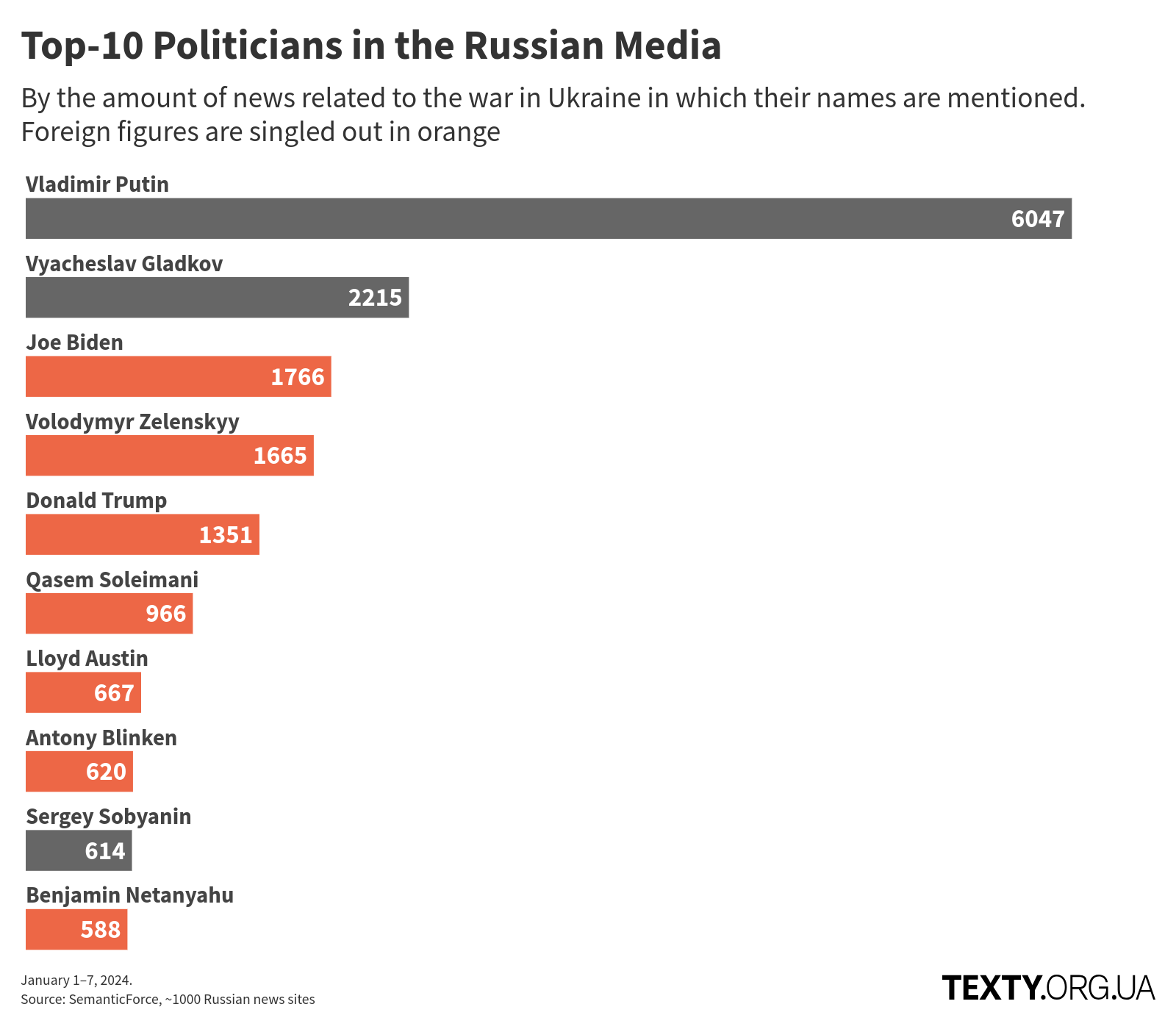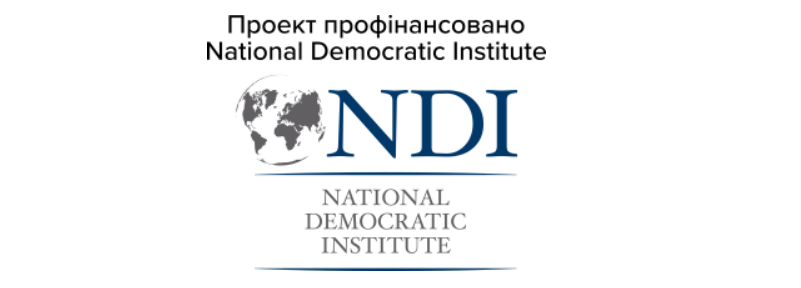Desperate Retaliation Strikes on Belgorod. Russian Media Monitoring Report, 1-7 January 2024
News reports claiming Ukraine’s strikes on Russian civilians were all over Russian media last week. The strikes on Belgorod were said to be Kyiv's desperate act of retaliation caused by its military defeats. The propagandists argued that Zelensky’s commanders deliberately target civilians contrary to Russia’s focus on military targets only.
They also blamed Ukraine’s air defense for the deaths of civilians. Actually, it was only the beginning of a long list. For example, Ukraine was said to be ruining the lives of German farmers whose protests were linked with their country’s support of Ukraine.
Read this article in Ukrainian

Follow the trending topics of Russian disinformation on our interactive dashboard “Disinformation about the War in Ukraine”
Putin’s election campaign is also a major focus of our monitoring efforts. Last week, the reports about the signing of a petition in support of Putin’s self-nomination managed to outnumber those on Ukraine’s military defeats.
This monitoring report covers these and other topics of the disinformation spread by Russian state media and online parajournalists to manipulate public opinion.
The Terrorist Ukraine
Last week, the Russian information space was dominated by news reports on the strikes on Belgorod. On 30 December, the center of Belgorod was rocked by explosions. According to the oblast governor Vyacheslav Gladkov, the strike had been launched by the AFU. Russian media accused Ukraine of violating the customs of war by targeting civilians and compared the Kyiv regime to ISIS terrorists.
Belgorod residents are waking up to the grim reality of living in close proximity to the front lines. No explanations are given, though. The media seem to ignore the cause and effect relationship between Russia's invasion into Ukraine and the war shifting to Russian territory.
The propagandists also tried to avoid mentioning Russian strikes on Ukraine on 29 December. This was in stark contrast to the jubilant reports of so-called experts on the strikes on Ukraine just days before the events in Belgorod: “The Russian army launched what could be the most numerous and powerful missile strike on all major Ukrainian cities during the entire SMO. It should be stressed that the Russian army targets exclusively military facilities to avoid victims among the future Russian citizens who live in Ukraine”.
While presenting the news on the explosions in Belgorod, the disinformers insisted that Kyiv was deliberately targeting civilians while Russia was carefully selecting military targets to hit, and that the deaths of Ukrainians were caused by sloppy air defenses: “It is the missiles fired by the AFU air defenses that are damaging almost all civilian facilities in Ukraine, not the Russian ones. Their systems are positioned amidst residential buildings – hence the death toll among the civilians”.
The so-called experts claimed that the Ukrainian government had turned into a Nazi dictatorship and that the West had been turning a blind eye and even supporting the “coup d'état” (the term used to refer to the Revolution of Dignity in Russia): "The West is losing to the authoritarian and ultra-nationalist Ukraine where national minorities are brutally suppressed and political assassinations have become commonplace”.
The strikes on Belgorod were called a “desperate gesture” to retaliate for battlefield failures: "We are witnessing acts of impotence as Kiev is targeting civilians while being unable to achieve any meaningful military success.”
In order to calm the Russian people and satisfy their thirst for blood, the media call every Russian strike on Ukraine an act of vengeance that has military purpose and brings Russia one step closer to victory: “The armed forces of the Russian Federation struck targets in Kiev, Kharkov and several other regions of Ukraine in response to the AFU strikes on Belgorod”, “The mayor of the capital of the nezalezhna Ukraine Klitschko reported blackouts the city's neighborhoods and suburbs while Ukrainian raged on public channels. The Ukrainians were wondering if that was “tit for tat” following their terrorist attacks in Belgorod and Donetsk or the everyday combat operations which never close for New Year”.
Kyiv vs German Farmers
The propagandists claim that Ukraine is draining the resources of the European Union member states. Kyiv is being accused of putting the EU on the brink of an economic disaster, driving a wedge among politicians and causing missiles to land on the EU territory.
Last week, Ukraine was accused of causing trouble for Germany’s agricultural industry: “German farmers are outraged by the preferential treatment of Ukraine. Interestingly, German media seem to be trying to keep the conflict under wraps.
On 8 January, German farmers launched a nationwide protest to continue for a week. They were soon joined by railroad workers. The farmers oppose the government’s plans to revoke diesel fuel subsidies for agricultural operators while the railroad workers demand shorter working hours and higher salaries.
Russian propaganda immediately linked those issues to aiding Ukraine: “A wave of farmer protests has swept over Germany! The media are pretending to ignore the riots and their true causes: the removal of diesel subsidies, cheap Ukrainian imports, the unjust free trade agreement and EU regulations”.
The German government argues that the decision to reduce the subsidies is driven by environmental concerns. The efforts are part of the budget policy following the decision of the Federal Constitutional Court. Unlike cars, there are no electric alternatives for heavy agricultural machinery in the the foreseeable future, and this is a problem indeed. This has been causing a rift between the supporters of green economy and agricultural workers, but Ukraine has nothing to do with it.
That being said, the members of the German Farmers' Association are concerned that the protests could be used to advance the right-wing agenda. In particular, such are the views of the pro-Russian Alternative for Germany (AfD). According to the president of the Association Joachim Rukvid, right-wing and other radical groups are not welcome to join the protests.
Ready, Steady, Go, Mr Putin!
Vladimir Putin's presidential campaign has kicked off in Russia. Although the outcome is already known, the dictator still needs to stick to the rituals for the sake of political optics.
Interestingly, the reports on the signing of a petition in support of Putin’s self-nomination managed to outnumber those on Ukraine’s military defeats last week.
Russian media do not even bother to portray a semblance of a race for the highest office. While other candidates are mentioned only in passing, Putin is given the full attention and described as “a real man” and a “great leader”.
This is how the official propaganda is convincing the public that there is no alternative to Putin.
Money is flying left and right. As early as 2024, pensioners should expect more benefits, insurance pensions will grow, payments will be indexed, the minimum wage will increase and the ‘maternity capital’ (the state support for families raising children — editor's note) will be maintained and increased as well.
All those concerned about the high inflation rate need not worry for it is about to go down once everything has been taken care of. Bright future is just round the corner. Therefore, raising the key interest rate is only temporary: “The increase of the key interest rate by the Central Bank is only temporary, and the regulatory stance will change once the inflationary pressures have been addressed”. The key rate is the annual interest rate which affects monthly payments under various kinds of loans. The higher the interest rate, the more expensive the loans. In December, the board of the Central Bank of Russia raised its key interest rate for the fifth time in six months — this time to 16%.
The Problems
We also turned our attention to the internal challenges reported by Russian media. As those difficulties are exacerbated by the sanctions, we should expect more coverage, however toned down and brief.
Eggs
While egg prices in Russia went up some time ago, the problem is still receiving media attention: “Eggs still remain pricey despite an increase in production. Some retailers are charging 200-220 rubles per dozen”. According to propaganda, the dynamic is driven by the increase in the welfare of Russians. As people are buying more eggs, the supply cannot catch up with the demand — elementary!
Cars
Growing car prices have been causing problems. Experts say that “new imported cars have grown in price by 27% since the beginning of 2023. In 2024, prices could go up another 20-40% depending on brand and the level of equipment”. However, experts seem to agree that the situation will be remedied soon as Russian manufacturers are about to start making cars in huge numbers now that import substitution is complete.
Fuel
When Russians worry about fuel prices, reassurances are not long in coming: “Gasoline prices were the second most important concern for Russians last year... The measures implemented by the authorities to limit the export of oil products did stabilize prices for a while, but they crept up again by the end of December” — "retail gasoline prices should remain stable”.
Ruble Exchange Rate
The Russian ruble-U.S. dollar exchange rate has been stabilizing. According to the Russian media, this is due to state intervention in the financial system, and that was all there was to say. Some experts, however, warn that the exchange rate should begin to change rapidly again after the elections: “In the next two to three months, the ruble/dollar exchange rate is likely to remain within the 87-92 range. After that, there are no signs which could point to the strengthening of the Russian currency”.

The Methodology
To monitor the information published on disinformation websites, we analyzed approximately 410,000 news reports collected from ~ 1000 Russian and occupation websites. The data for the analysis was provided by SemanticForce.
Each paragraph was processed using an algorithm which defines its topic automatically. The resulting topics (i.e. groups with similar content) were short-listed by the topics relating to the war or its consequences for Russia. The number of mentions of a certain topic was then counted for each publication. Our conclusions are based on the respective findings and the quotes from paragraphs referring to each topic.


